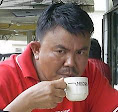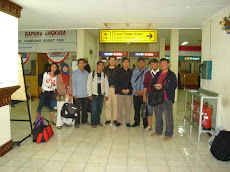Selasa, 18 Maret 2008
 First published in The Jakarta Post, July 25, 2006
First published in The Jakarta Post, July 25, 2006
by Alpha Amirrachman, Contributor, Pontianak
During his childhood, Kristianus "Atok" lived in the village of Setom, Hulu District, Landak Regency, West Kalimantan, where about 70 percent of its 200 population were Madurese.
He was an indigenous Catholic Dayak, yet he mingled with the Muslim Madurese children very well. "Just as with any other kids, I played excitedly with them.
"I had several good Madurese friends of whom I have unforgettable memories," Atok recalled during a recent discussion. It was organized by the International Center for Islam and Pluralism in collaboration with the European Commission and the Forum for Interfaith and Cultural Dialog of Borneo, in Pontianak.
It is because of this that Atok felt extremely uncomfortable when the Madurese were forced to leave the village during the escalated tension between Madurese and Dayaks in the 1980s.
There were several physical attacks against the Madurese and their property as they were usually stereotyped as aggressive and economically dominant. The Madurese gradually left the village, sold their land and resettled in Pontianak or other areas. Atok lost his Madurese friends.
But the ethnic unrest, mainly between the Dayaks and Madurese, flared again in 1999 and was recorded as one of the most massive conflicts in the island; it saw roughly 15,000 Madurese flee to Madura.
The conflict started when a group of Madurese stabbed two Dayak teenagers in 1996; this was followed by thousands of Dayaks running amok in the western districts of West Kalimantan, destroying much Madurese business property, including crops and market stalls.
The ethnic tensions are generally attributable to the opening up of the forest for immigration programs, plus logging, mining and trading, which have resulted in increased competition for skilled jobs in the province and have pushed Dayaks to the margins.
However, the image that the indigenous Dayaks are inferior and unskilled began to be portrayed during the colonial period of the Dutch and was intensified during the New Order government with its massive development approach.
Atok joined a non-governmental organization (NGO) that was concerned with the empowerment of Dayaks during his time as a student in the agriculture faculty at the University of Tanjungpura. However, he resigned as he felt uncomfortable with the single-ethnic orientation of the organization.
He completed his master's degree in sociology from the same university, writing a thesis titled Social interaction among the Dayaks and Madurese in Sebangki District.
After the 1999 riot, he and other concerned intellectuals representing a variety of ethnic groups initiated a civil society community meeting that included student, NGO and women activists.
They set up an NGO, Nusantara Empowerment of People-Forest-Reefs Foundation (YPPN), on August 20, 2000. It was a multiethnic body with the vision of promoting democracy based on wisdom, equality and plurality; Atok was elected as its chairman.
YPPN is currently preoccupied with activities concerning the strengthening of fragmented society. "We shall never be able to preserve our natural resources or make use of them professionally and responsibly if people are fragmented and keep fighting or competing for their share by any means," said Atok.
Collaborating with other institutions and funding agencies such as Frederich Naumann Stiftung, TIFA and Cordaid, YPPN has run a wide range of programs. These include a network for nonviolent community action, a study of traditional land tenure rights and a community seed bank.
Also covered have been multiethnic community facilitation, training for community leaders and for radio coverage of the 2004 general election, joint economic and cultural activities, a kampong library and education that stresses nonviolence.
Asked which program he thought the most rewarding, he answered nonviolence education, which involves 30 senior high schools from three regencies: Landak, Bengkayang and Pontianak.
Activities in the program include camping, a children's jamboree and intercultural visits. He recalled that during the visits some students were asked to stay with families of different ethnicity. "Some Dayak students cried, as they were so terrified that the Madurese would be rude or hurt them."
"But it turned out that the Dayak students and the Madurese families got along together very smoothly during the three-day stay. They shared jokes and often burst into laughter.
"The stereotypes seem to be gradually broken down -- it had to start with children because their involvement from a young age has a long-term impact in the future," said Atok who was born on Aug 28, 1966, and is married to Magdalena. They have three children.
Indeed, Atok's fond childhood memories of good relations with Madurese friends may still linger, but expanding this to wider communities that are dogged with entrenched stereotypes and prejudices requires patience and much hard work by all parties concerned.
"I cannot do it alone," Atok observed.











0 Comments:
Post a Comment